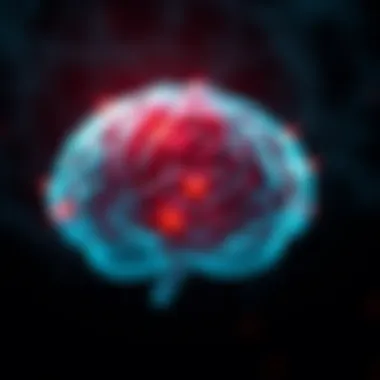Understanding the Effectiveness of Bipolar Medications


Intro
Throughout this discussion, we will explore the various factors influencing the effectiveness of these medications. We will delve into the unique mechanisms of action exhibited by different classes of drugs, consider personal variations in response, and examine how these medications interact with psychotherapeutic strategies. With input from the latest research and expert insights, we aim to equip readers with a well-rounded view of bipolar medications that fosters informed decision-making in treatment planning.
Understanding Mental Health and Well-being
What is Mental Health?
Mental health encompasses a person's emotional, psychological, and social well-being. It affects how we think, feel, and act, playing a significant role in how we handle stress, interact with others, and make decisions. A balance in mental health can contribute positively to our daily lives,
while an imbalance can lead to disorders like depression or anxiety.
The Importance of Prioritizing Mental Well-being
Prioritizing mental well-being isn't merely a buzzword; it's a necessity. In today's fast-paced world, it’s easy to overlook how essential mental health is to overall well-being. When we take care of our mental health, we can improve our quality of life, foster resilience in the face of challenges, and improve our relationships. It's imperative that both individuals and communities cultivate environments that support mental health to create a healthier society.
Common Mental Health Challenges and Disorders
Bipolar disorder is just one of many mental health challenges that individuals face. Other prevalent conditions include anxiety disorders, major depression, and schizophrenia. Each of these disorders has its specific characteristics, treatment approaches, and implications for those affected. Recognizing these distinctions is crucial when concepts of efficacy and treatment strategies are discussed, as the approach to therapy may differ considerably.
Strategies for Improving Mental Health
Self-care Techniques and Practices
Self-care plays an invaluable role in maintaining mental health. Simple practices like engaging in hobbies, spending time in nature, or keeping a journal can greatly enhance one's emotional state. Small actions, when taken regularly, can accumulate into significant overall mental health benefits.
Building Resilience and Stress Management
Resilience isn’t just about bouncing back; it’s about thriving even after setbacks. Practicing stress management techniques such as deep-breathing exercises, progressive muscle relaxation, or engaging in regular physical activity can strengthen one’s resilience, making it easier to cope with the challenges of life.
Seeking Professional Help: Therapy and Counseling
Professional help can also be a game changer. Therapists and counselors are trained to help individuals navigate the complexities of mental health. Cognitive Behavioral Therapy (CBT), for example, has proven effective for many struggling with bipolar disorder and other mental health challenges. Seeking help should be viewed not as a sign of weakness, but rather as a commendable step towards achieving mental wellness.
Finding Balance in Life
Healthy Lifestyle Choices: Diet, Exercise, and Sleep
Living a balanced life often starts with making conscious lifestyle choices. Eating a nutritious diet, maintaining a consistent exercise routine, and ensuring adequate sleep form the bedrock of physical and mental well-being. Each of these elements plays a contribution to mood regulation and overall mental health.
Mindfulness and Meditation Practices
Incorporating mindfulness and meditation into daily routines can provide essential tools to help manage stress and anxiety. These practices promote a sense of presence and awareness, enabling individuals to experience emotions without becoming overwhelmed. While it may be challenging at first, the persisting practice can lead to improved emotional regulation over time.
Setting Boundaries and Managing Time Effectively
Setting boundaries and managing time effectively cannot be understated. This goes hand in hand with preventing burnout. Overcommitting oneself can take a toll on mental health. Learning to say no and prioritizing tasks are essential strategies for maintaining equilibrium in life, especially for those managing bipolar disorder.
Enhancing Personal Development
Goal Setting and Productivity Tips
Having clear goals can lead to increased motivation and a sense of purpose. Whether in personal life or professional endeavors, setting achievable goals helps individuals maintain focus and progress. Regularly reassessing these goals can also foster adaptability, an essential trait when navigating mental health journeys.
Building Healthy Relationships and Social Connections
Nurturing healthy relationships is fundamental in the quest for mental well-being. Support systems, be it friends or family, contribute significantly to an individual’s emotional resilience. Engaging positively with others can alleviate feelings of isolation—a common struggle among those with bipolar disorder.
Practicing Gratitude and Positivity
Practicing gratitude is more than just a nice idea; it can enhance emotional well-being. Taking a few moments each day to reflect on what one is thankful for can shift perspective. Engaging in conscious positive thinking can have ripple effects, leading to improvements in mood and outlook on life.
Tips for Maintaining Mental Well-being
Strategies for Preventing Burnout
Preventing burnout is crucial, especially for those who manage chronic mental health conditions. Scheduling regular downtime, engaging in activities that bring joy or relaxation, and recognizing the signs of stress can help individuals maintain their mental health.
Coping with Challenges and Setbacks
Challenges are a part of life, and coping strategies can make all the difference when faced with setbacks. Techniques like talking things out with a friend, creative expression, or even consulting mental health professionals can be beneficial during these tough times.
Creating a Supportive Environment
Finally, cultivating a supportive environment, whether in the workplace or at home, can influence mental health outcomes. Being surrounded by understanding and encouraging individuals creates a buffer against stress and promotes healing.
By unraveling the complexities at play in bipolar medication effectiveness, readers will not only enhance their understanding of bipolar disorder but also appreciate the crucial role that mental health plays in the broader scope of well-being.
"Mental health is just as important as physical health in achieving overall well-being." - NIMH
For more in-depth information, readers can explore reputable resources such as Wikipedia or Britannica. Understanding treatment efficacy is a lifelong journey, but one worth embarking upon.


The Nature of Bipolar Disorder
Understanding bipolar disorder is crucial, as it sets the foundation for comprehending how medications can impact those living with this condition. This section addresses the intricacies of bipolar disorder, highlights its diagnosis, and distinguishes the various types. By parsing this information, we can appreciate the complexities involved in choosing effective treatment options.
Defining Bipolar Disorder
Bipolar disorder is a mental health condition characterized by extreme mood swings, which encompass emotional highs (mania or hypomania) and lows (depression). An accurate definition is vital because it helps in understanding the challenge faced by individuals who live with this disorder. Knowing the definitions and key traits means one can better grasp the symptoms, treatment, and management styles needed in a real-life setting.
Types of Bipolar Disorder
Bipolar Disorder
Bipolar I Disorder is marked by manic episodes lasting at least seven days or by manic symptoms so severe that immediate hospital care is necessary. A key characteristic of Bipolar I is the potential for extreme impacts on one’s daily life. This type is significant as it often leads to detrimental consequences when untreated. Its defining feature is the occurrence of manic episodes, which can result in poor decision-making and severe disruptions in life. Despite these challenges, understanding Bipolar I is beneficial because it informs targeted treatment strategies, allowing for the exploration of different medication options that could stabilize mood.
Bipolar Disorder
In contrast, Bipolar II Disorder involves a pattern of depressive episodes and at least one hypomanic episode, but never reaches the full-blown manic phase that characterizes Bipolar I. Its main feature is the presence of hypomania, which while less severe than mania, can still disrupt an individual’s functioning. Bipolar II is relevant here as its symptoms can be less obvious, sometimes leading to misdiagnosis and under-treatment. Being aware of Bipolar II enables a more comprehensive understanding of mood disorders and highlights the need for careful monitoring of depressive episodes.
Cyclothymic Disorder
Cyclothymic Disorder features periods of hypomanic symptoms and periods of depressive symptoms that last for at least two years in adults (one year in children and adolescents) but does not meet the criteria for a hypomanic episode or a major depressive episode. This type is often regarded as less severe, yet still poses significant challenges in terms of maintaining everyday functioning. Recognizing Cyclothymic Disorder is essential as it emphasizes the nuances in bipolar conditions, revealing that even milder variants need careful consideration in treatment and may still lead to significant distress or impairment.
Symptoms and Diagnosis
Understanding the essential symptoms of bipolar disorder helps in diagnosing it properly and can direct treatment effectively. The ability to identify signs plays a pivotal role in managing expectations and setting up support networks.
Manic Episodes
Manic episodes are characterized by an excessively elevated mood, increased energy, and heightened activity. They can lead to impulsive behaviors and risky decisions, which often complicate the lives of those affected. In the context of treatment, being aware of manic episodes assists healthcare providers in determining the urgency and type of intervention required. Recognizing these indicators ensures that treatment is promptly adjusted—essential for avoiding severe ramifications, such as financial or relational issues.
Depressive Episodes
Conversely, depressive episodes are marked by feelings of sadness, emptiness, and loss of interest in activities previously enjoyed. Recognizing these symptoms is crucial as they profoundly affect quality of life and overall functionality. The nuances between depressive episodes and regular sadness are essential for diagnosis. Understanding this distinction enables a more tailored therapeutic approach, balancing medications and potentially integrating therapies.
Mixed Features
Mixed features refer to experiencing symptoms of both mania and depression simultaneously. This combination can lead to particularly complex situations, where the treatment can become tricky. Recognizing mixed features is vital for managing bipolar disorder effectively. It shows the necessity of a flexible treatment plan that addresses both sides of the disorder.
By completing a detailed exploration of these facets of bipolar disorder, one can better understand the efficacy of various medications used in treatment. Understanding the nature of this disorder is paramount in tailoring interventions that can lead to more effective management strategies.
Pharmacological Approaches to Treatment
Pharmacological approaches to treatment are pivotal in managing bipolar disorder. They represent a cornerstone of care, often serving as the first line of defense against the manic and depressive episodes characterizing the condition. Understanding these approaches helps demystify the complexities of treatment and shines a light on the multifaceted strategies available to individuals grappling with bipolar disorder.
Through medications tailored to specific needs, patients can experience stabilizing effects that enable better control over their mood swings. Psychiatrists typically rely on a combination of different classes of medications to tailor treatment, considering factors like history, family dynamics, and response to past therapies.
Overview of Bipolar Medications
When one looks at bipolar medications, it’s essential to categorize them effectively to grasp their distinct roles. Three primary types regularly come into play: mood stabilizers, antipsychotics, and antidepressants. Each has its own unique characteristics and potential impacts on an individual’s journey.
Mood Stabilizers
Mood stabilizers are often the unsung heroes in treating bipolar disorder. Their primary function is to help keep mood swings at bay, thus preventing the devastating impacts of manic or depressive episodes. Lithium, for instance, is a well-known mood stabilizer that has been around for decades and is often celebrated for its efficacy.
One key characteristic of mood stabilizers is their ability to not only reduce the intensity of mood swings but also diminish the frequency of these episodes occurring in the first place. This makes them a foundational choice in treatment, celebrated for their long-term benefits. However, they can pose challenges, particularly with side effects like weight gain or gastrointestinal disturbances, which may dissuade some patients from adhering to treatment plans.
Advantages:
- Long-term efficacy in mood stabilization.
- Decrease in episode frequency.
Disadvantages:
- Potential for side effects affecting adherence.
- Monitoring required for dosage and effectiveness.
Antipsychotics
Antipsychotics play a crucial role in managing acute manic episodes and can be crucial in stabilizing mood. Medications such as quetiapine and aripiprazole have found their way into treatment regimens, providing a safety net for patients experiencing heightened manic states. The unique feature of antipsychotics is their rapid action in addressing manic symptoms, thus preventing dangerous situations arising from extreme behaviors.
The key characteristic that sets antipsychotics apart is their dual role; while they are traditionally used for managing psychosis, they also benefit many individuals with bipolar disorder, giving a clear advantage in rapidly changing moods. Nonetheless, as with mood stabilizers, some antipsychotics can come with significant side effects, such as sedation and metabolic changes, which necessitates careful monitoring.
Advantages:
- Quick response time in treating manic episodes.
- Effective in reducing psychotic symptoms.
Disadvantages:
- Possibly sedating effects.
- Risk of metabolic side effects requiring oversight.
Antidepressants
Antidepressants can play a controversial role in treating bipolar disorder. They are often prescribed cautiously as they can sometimes trigger manic episodes when used alone. Medications like fluoxetine and sertraline can be beneficial, especially in treating the depressive phase of bipolar disorder when combined with a mood stabilizer. This combination can aid in alleviating severe depressive symptoms while keeping the risks of mania in check.
The noteworthy aspect of antidepressants is their potential to improve mood, allowing individuals to engage in daily activities, thus enhancing quality of life. However, the pivotal concern exists around their unilateral usage, emphasizing the need for a comprehensive treatment plan that also involves mood stabilizers to mitigate the risk of triggering mood switches.


Advantages:
- Can significantly relieve depressive symptoms.
- Facilitate re-engagement in life activities.
Disadvantages:
- Risk of inducing manic episodes if not paired correctly.
- Requires careful observation to avoid destabilization.
Efficacy of Mood Stabilizers
Mood stabilizers have proved effective in managing both manic and depressive phases in bipolar disorder. The literature suggests that consistent usage of these medications can lead to improved mood stability and overall quality of life. Long-term studies indicate that patients using mood stabilizers often experience fewer hospitalizations, a significant metric in effectiveness. Real-world applicability shines in adaptations made for individualized care, allowing patients to find what genuinely works for them despite the initial difficulties they may face on their medication journey.
Role of Antipsychotics in Management
Antipsychotics have a pivotal role in the management of acute symptoms, especially during manic episodes. Their core contribution lies in rapidly alleviating overwhelming symptoms, allowing individuals the space to regain stability. Notably, they have garnered positive attention for their ability to handle psychotic features that may arise during severe mood states. Their integration into treatment regimens speaks volumes about their essential contribution to overall therapy strategies within bipolar disorder care.
Mechanisms of Action
Understanding the mechanisms of action is crucial when discussing the efficacy of bipolar medications. It unveils how these drugs interact on a biochemical level to help manage the fluctuations associated with bipolar disorder. Knowing the interplay of neurotransmitters and brain function can lead to better treatment choices and outcomes. Medications that affect neurotransmitter levels can serve as powerful tools to restore balance in mood-stabilizing and mood-enhancing capacities.
Biological Basis of Bipolar Disorder
The biological underpinnings of bipolar disorder are complex, intertwining genetic, neurochemical, and environmental factors. It is well acknowledged that mood disorders, including bipolar disorder, are often influenced by the way our brain processes neurotransmitters. These neurotransmitters—chemicals like serotonin, dopamine, and norepinephrine—are pivotal in regulating mood.
Research points out that people with bipolar disorder may have atypical levels of these neurotransmitters during both manic and depressive episodes. For instance, heightened dopamine activity can be observed during manic phases, leading to symptoms such as euphoria or increased energy. Conversely, during depressive episodes, dopamine and serotonin levels tend to drop significantly, contributing to feelings of despair and hopelessness.
"Each brain functions differently, making every individual’s experience with bipolar disorder uniquely challenging."
Additionally, specific genetic markers might influence the production and regulation of these neurotransmitters, creating a heterogeneous picture of how bipolar disorder manifests in various patients. By tapping into this biological framework, healthcare professionals can better tailor medication regimens that target these neurotransmitter imbalances.
How Medications Alter Neurotransmitter Levels
Most bipolar medications work through the modulation of neurotransmitter levels. Mood stabilizers, for instance, are often designed to balance the extremes seen in bipolar disorder. They do this in part by influencing sodium channels within neurons and altering calcium signaling pathways. This mechanism prevents excessive neurotransmitter release—key for averting manic or depressive episodes.
Consider lithium, a cornerstone in the treatment of bipolar disorder. It appears to stabilize mood by affecting glutamate levels in the brain and enhancing serotonin transmission. This results in reduced manic and depressive episodes for many individuals. Other medications like Lamotrigine and Valproate tend to work similarly, but may uniquely influence different neurotransmitters or receptors, providing options tailored to specific patient needs.
In case of antipsychotics, these drugs can block dopamine receptors, particularly the D2 receptor, decreasing hyperactive dopamine signaling during manic states. However, it's essential to recognize that these medications may result in side effects, emphasizing the need for a careful assessment of the risks versus benefits.
The right balance in neurotransmitter manipulation is vital to optimizing treatment for bipolar disorder. A comprehensive understanding of how these medications interact with neurobiology not only fosters trust in the treatment plan but also encourages adherence, a key element in achieving sustained recovery.
Individual Variability in Treatment Response
The complexities inherent in bipolar disorder treatment cannot be overemphasized, particularly the influence of individual variability on treatment response. This variability signifies that not all patients respond identically to medications, making it crucial for both healthcare professionals and patients alike to grasp its implications. Delving deeper into this topic reveals a multitude of factors, including genetics, coexisting health issues, and commitment to following treatment regimens that significantly shape the effectiveness of prescribed medications.
Understanding Genetic Influences
Genetic makeup plays a pivotal role in pharmacogenomics, which is the study of how genes affect a person’s response to drugs. Variations in specific genes can lead to differences in drug metabolism, efficacy, and tolerability among individuals. For example, individuals with a particular variant of the CYP2D6 gene may metabolize certain medications at a slower or faster rate, affecting how well those drugs manage their symptoms.
It's fascinating how some patients may find certain mood stabilizers effective, while others might experience minimal benefits, or even adverse reactions. As the field of personalized medicine continues to evolve, understanding these genetic influences offers hope for more targeted and effective treatment options. Genetic testing can assist clinicians in selecting the right medication based on a patient’s unique profile, which may enhance therapeutic outcomes.
The Impact of Comorbid Conditions
Comorbidity—when a person suffers from more than one disorder at the same time—plays a significant role in treatment efficacy. Many individuals with bipolar disorder also grapple with other mental health issues, such as anxiety disorders, substance use disorders, or even physical illnesses like diabetes. The presence of these additional conditions can complicate treatment plans significantly.
"Managing bipolar disorder alongside other conditions requires a nuanced approach that considers the interplay between illnesses."
For instance, a patient with bipolar disorder and depression may find that traditional antidpressants exacerbate their manic episodes. This necessitates a more tailored approach to treatment, and a careful monitoring process to navigate the interplay of symptoms. Social, economic, and psychological factors, including access to resources and support systems, further shape these unique treatment landscapes, calling for a personalized strategy in medication management.
Adherence to Treatment Regimens
Adherence—or the degree to which patients follow their prescribed treatment plans—significantly influences medication efficacy. The motivation to stick with a regimen can be impacted by various factors like side effects, misunderstanding of the treatment’s importance, or even stigma surrounding mental health. Studies consistently emphasize that patients who understand their condition and the purpose of their medications are more likely to adhere to their prescribed plans, which leads to better outcomes.
Moreover, the presence of social support systems can bolster adherence. Patients who discuss their treatment openly with friends or loved ones tend to navigate challenges more effectively, thus increasing compliance. Establishing a trusting relationship between patients and healthcare professionals is equally vital, fostering an environment where concerns about side effects or misunderstandings can be addressed promptly.
Challenges in Bipolar Medication Management
Managing bipolar disorder through medication is a complex undertaking. The vitality of evaluating challenges in bipolar medication management cannot be overstated, as it plays a crucial role in ensuring that individuals receive effective therapeutic interventions. The spectrum of bipolar disorder presents unique hurdles, ranging from complicated side effects to prevailing stigma around treatment. Addressing these issues allows for a holistic understanding of treatment efficacy and improves adherence, ultimately enhancing overall mental health outcomes.
Side Effects of Medications
One of the most significant barriers to effective management of bipolar disorder lies in the side effects that can stem from medications. While mood stabilizers, antipsychotics, and antidepressants can be life-altering in terms of stabilizing mood, they can also be a double-edged sword. Patients often struggle with various side effects, which can include weight gain, drowsiness, and gastrointestinal issues, among others. For instance, lithium, a primary mood stabilizer, may boost mood but also lead to nausea and tremors. These side effects, in their turn, can negatively impact adherence to prescribed regimens.
"Medications often do more than just treat symptoms; they can alter the quality of one’s daily life."
It's crucial for both healthcare providers and patients to engage in open dialogues about these potential side effects. Understanding which areas may cause most distress and impact day-to-day functioning helps tailor treatment plans that can mitigate these adverse effects. Patients may benefit from:
- Regular Monitoring: Frequent check-ins can catch side effects early, allowing for adjustments before they spiral out of control.
- Personalized Care: Different medications may suit different individuals better. A careful trial and adjustment cycle is often necessary.
- Education and Communication: Knowledge of side effects empowers patients and fosters cooperation between them and their healthcare providers.
Stigma Surrounding Pharmacological Treatment
Another formidable challenge in managing bipolar disorder is the stigma that often surrounds the use of medications. Many individuals harbor misconceptions about mental health treatment, viewing medications as a sign of weakness or a reluctance to face problems head-on. This stigma can deter those affected from seeking help or sticking to their prescribed medication regimen.


The societal perspective often blurs the line between treatment and dependency. As a result, patients sometimes lingeringly feel as if they are being defined by their diagnosis rather than their capacity to manage their condition. Consequently, the fear of judgment can lead to:
- Diminished Self-Esteem: Feeling the brunt of stigma may exacerbate depressive symptoms, making individuals less inclined to admit their struggles.
- Isolation: Avoiding discussions about treatment may lead to social withdrawal, further worsening mental health.
- Non-Adherence: Fear of being labeled can drive individuals away from effective treatments.
Addressing stigma requires communal efforts, including education campaigns and supportive community groups. These platforms can help shift perspectives, showing that seeking help and using medication is not a sign of weakness but rather a proactive step toward greater wellbeing. Inspired dialogues and shared personal experiences can dismantle misperceptions and build a culture of understanding and support.
Through acknowledging both the side effects of medications and the stigma attached to them, we can better navigate the challenges surrounding bipolar medication management. Recognizing these obstacles paves the way for more informed strategies and empathetic approaches, enabling individuals to achieve a more stable and fulfilling life.
Comparative Effectiveness of Therapeutic Options
When discussing bipolar disorder management, the topic of comparative effectiveness becomes crucial. It refers to the evaluation of different therapeutic approaches to determine which yield better outcomes for patients. The effectiveness of treatments can vary significantly due to numerous factors, including individual patient characteristics, the severity of the disorder, and the presence of comorbid conditions. By understanding the comparative effectiveness of therapeutic options, clinicians and patients alike can make informed decisions tailored to personal circumstances and treatment goals.
Medication vs. Psychotherapy
The debate surrounding medication versus psychotherapy as treatment options for bipolar disorder is ongoing. Both have unique attributes and can lead to improved outcomes for different patients. This section looks more closely at two leading forms of psychotherapy: Cognitive Behavioral Therapy (CBT) and Interpersonal and Social Rhythm Therapy (IPSRT).
Cognitive Behavioral Therapy
Cognitive Behavioral Therapy stands out as a particularly dynamic therapeutic approach. It harnesses the power of structured interventions to identify and reshape negative thought patterns that might contribute to mood instability. A key characteristic of CBT is its focus on the present, helping individuals recognize their role in managing their feelings through actionable strategies.
What makes CBT beneficial is its strong empirical backing. Many studies indicate its impactful role in lowering the recurrence rate of manic and depressive episodes when used alongside medication. One unique feature of CBT is its adaptability; it can be tailored to fit the needs of each patient, enhancing personal engagement with the treatment process.
However, CBT's effectiveness can be mixed based on the patient's willingness to participate actively in their therapeutic journey. Some individuals might find such active involvement challenging, which could limit the benefits they gain from this method.
Interpersonal and Social Rhythm Therapy
On the other hand, Interpersonal and Social Rhythm Therapy offers a different avenue for managing bipolar disorder. This therapy zeroes in on the importance of maintaining regular daily routines and enhancing social functioning. A key feature of IPSRT is its emphasis on stabilizing sleep patterns and daily rhythms, which are often disrupted in individuals with bipolar disorder.
People find IPSRT appealing because it blends interpersonal elements with a focus on biological rhythms, fostering stability in mood. This approach recognizes that social interactions and day-to-day routines can significantly influence mental health. Furthermore, it not only aims to manage existing symptoms but also seeks to prevent future episodes.
Nonetheless, the necessity for intensive group discussions can be a downside for some; if individuals are not comfortable sharing personal experiences, they may struggle to reaping the full benefits of therapy.
Integrating Pharmacotherapy and Psychotherapy
Combining pharmacotherapy and psychotherapy has emerged as a popular strategy for holistic treatment of bipolar disorder. It leverages the strength of both medication and therapy to address various facets of the disorder. Medications like mood stabilizers can help in managing immediate symptoms, while psychotherapy can provide coping strategies and tools needed for long-term management.
This integrative approach acknowledges that bipolar disorder treatment should not be one-dimensional. Each patient is unique, and so are their treatment needs. Adapting strategies based on ongoing assessments can lead to more favorable long-term results.
Finally, more extensive research and patient-oriented studies remain essential to continue enhancing our understanding of the comparative effectiveness of these therapeutic options. Readers may refer to sources such as NIMH and Mayo Clinic for up-to-date findings and guidelines regarding bipolar disorder treatment strategies.
Research Perspectives on Medication Efficacy
When it comes to treating bipolar disorder, understanding the efficacy of medications is paramount. Research perspectives play a critical role in not only validating current treatments but also steering future innovations. It’s like having a compass guiding through a complex landscape; without it, navigating through the myriad of medications and therapies could easily become overwhelming.
The benefits of focusing on research perspectives are manifold. First, it provides a clear view into what truly works. While anecdotal evidence and personal experiences are valuable, they must be supported by rigorous studies to ensure what works in practice is based on evidence. Moreover, these studies can illuminate the nuances of treatment effects—such as variations in how different demographics respond to medications. Attention to these details can help tailor approaches on an individual basis.
Additionally, delving into research perspectives allows for informed decision-making by healthcare providers and patients alike. It's one thing to know a medication could work; it�’s another to understand how well it works for a specific individual given their unique circumstances. This helps foster cooperation between patients and providers, enabling them to navigate challenges together as a team rather than as isolated players.
But not all studies are created equal. Different methodologies, sample sizes, and measures of success can lead to confusion. By being critical consumers of research, individuals, families, and clinicians can better sift through the noise. This critical perspective is essential for grasping both the implications of findings and the limitations of studies.
Of course, one has to consider time and context. Medication efficacy can often shift with new research unveiled. One day, a mood stabilizer could be deemed effective, while months later, newer trials might paint a different picture. Keeping abreast of ongoing findings is critical. They provide the most recent insights and let one stay ahead of the curve in treatment planning.
"The ability to heal is much more about the understanding of medication than just administering it." - An important reminder about the complexity of treatment.
Effectively interpreting research could pave the way for better communication, enabling patients to voice their needs and expectations while also preparing them for potential outcomes. All these layers matter when working towards achieving mental well-being and a better quality of life.
Latest Findings in Clinical Trials
Recent clinical trials have provided a wealth of information about the efficacy of bipolar medications. For instance, studies on lithium—a long-standing mood stabilizer—have consistently shown that it significantly reduces the risk of suicide in patients with bipolar disorder. A recent trial involving over 1,000 participants found a 60% reduction in suicide attempts among those using lithium compared to those on placebo. This has led many professionals to reaffirm lithium's place as a cornerstone in treatment regimens despite the potential side effects.
In contrast, new-generation antipsychotics, such as lurasidone, have been under scrutiny as researchers delve into their comparative effectiveness. Trials indicate that these medications can provide considerable relief during depressive episodes and can also stabilize mood with less sedation compared to traditional antipsychotics. However, there is still a heated debate on the long-term effects, particularly concerning metabolic risks.
The key takeaway from these trials is not just about efficacy but also about understanding the long-term trajectory of treatment. Collecting data about side effects, patient satisfaction, and medication adherence remains essential for developing comprehensive treatment strategies.
Long-term Outcomes of Medication Use
Long-term outcomes are integral when considering the efficacy of bipolar medications. Research shows that sustained use of mood stabilizers can significantly improve functional outcomes for individuals. Those who adhere to treatment generally report fewer manic and depressive episodes, allowing them to lead a more balanced lifestyle.
However, it’s worth mentioning that not all patients experience the same benefits over extended periods. Some may develop resilience to medications, necessitating adjustments or a complete overhaul of their treatment plan. Studies indicate that about 30% of patients see diminishing returns on efficacy after several years. This phenomenon underlines the importance of regular reassessment of treatment strategies and tweaks as needed.
Also, longitudinal studies have begun to highlight the role of psychosocial factors in medication efficacy. Factors such as social support networks, access to psychotherapy, and even lifestyle habits play significant roles in shaping outcomes. Thus, medications alone cannot be viewed in a vacuum; they exist within a broader context of a patient’s life experiences and choices.
Combining findings from clinical trials with long-term observational studies can provide a fuller picture. This integrated perspective helps in developing more comprehensive treatment strategies tailored to the needs of individuals with bipolar disorder. By doing so, stakeholders in mental health can better achieve the goal of improving overall patient well-being in both the short and long run.
The interplay between research, clinical trials, and patient experiences shapes a richer understanding of bipolar medications and their effectiveness. It is crucial not to overlook these vital aspects when navigating the path toward mental health management.
Future Directions in Bipolar Disorder Management
In the constantly evolving landscape of mental health care, understanding the future directions for managing bipolar disorder is crucial. This topic bears significance not just for healthcare professionals but also for individuals wrestling with the challenges of this disorder and their loved ones. The effective management of bipolar disorder is an ongoing journey that requires a synthesis of innovation, research, and patient-centered care.
One of the most important elements is the potential for emerging therapies and innovations. As research unfolds, novel medications and treatment modalities are being developed to enhance the efficacy of existing options. There has been a noticeable shift towards personalized medicine, which tailors treatment plans based on genetic profiles and individual responses. This ensures that patients receive a treatment that works best for them, minimizing adverse effects while maximizing therapeutic benefits. Notably, breakthroughs in neurobiology shed light on the underlying mechanisms of bipolar disorder, allowing for targeted interventions.
Furthermore, holistic approaches in treatment are gaining traction. Recognizing that mental health does not exist in a vacuum, these methods incorporate physical, emotional, and social well-being. Future directions in bipolar management are leaning heavily on strategies that consider lifestyle changes, dietary adjustments, mindfulness practices, and community support as critical components in treatment plans. This comprehensive approach aids in fostering resilience and stability, which is vital for individuals living with bipolar disorder.
Future management strategies for bipolar disorder will hinge on how well we can integrate these innovative therapies and holistic approaches into everyday treatment.
Exploring these avenues can diminish stigma while offering people living with bipolar disorder hope. Ensuring effective communication between healthcare providers and patients is integral to anticipating the future of care in this domain. This not only enhances adherence to treatment plans but reinforces a collaborative spirit vital in the therapeutic alliance.
As we peer into the horizon, the focus on these future directions can pave the way for more informed and individualized strategies, ultimately leading to better outcomes for those affected by bipolar disorder. Keeping abreast of the latest findings is essential for both practitioners and patients, highlighting the need for continued research and open dialogue.















